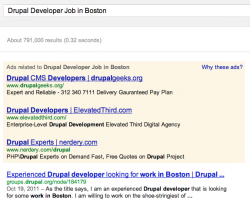 Recruitment agencies oftentimes fall into a trap when it comes to posting job ads. I get the sense they feel they have to sell people on the opportunity or the company through the ad’s title in order to get them to click through and read the job description. Think of when you were looking for jobs on Craigslist or Indeed and you saw titles like “In Need of a Marketing Guru” or “Looking for .Net Ninjas.”
Recruitment agencies oftentimes fall into a trap when it comes to posting job ads. I get the sense they feel they have to sell people on the opportunity or the company through the ad’s title in order to get them to click through and read the job description. Think of when you were looking for jobs on Craigslist or Indeed and you saw titles like “In Need of a Marketing Guru” or “Looking for .Net Ninjas.”
Although at first glance I get what they’re going for, it’s an attempt to set their ad apart from the rest, and for that I can appreciate the effort. However, what I don’t think recruiters realize is the back-end implications they are opening themselves up to that can seriously handicap them in getting the perfect candidate.
There’s a vibe out there that adding superlatives in job titles for almost every industry is considered passé now a days. I recently took to Quora to get some input on my theory about whether or not developers still appreciate being called “rockstars” or “ninjas.” If you click here, you can see I got some very colorful answers:
Although I’m inclined to agree with them, there was some evidence to the contrary. When discussing it with recruiters in my company, there were some who said they’ve had very good success with it. They claim it incites applications from young energetic developers who are looking to come into a company with guns blazing and ready to make a splash; so if that is what the company is looking for, then I suppose there is some value to it.
However, there is no excuse for putting those words in the title. If you are in fact looking for young talent who can come in and make a difference, there are ways around it that are much more SEO friendly. For instance, I recently came across an ad that said “We are Looking for a Drupal Rock Star.” That ad may get clicked on by people scanning for jobs, but chances are it won’t be found high up through searches for relevancy.
Let’s compare someone looking for a “Drupal Developer Job in Boston” with “we are looking for a Drupal Rock Star on Google. Think about the words being used:
We are Looking for a Drupal Rock Star
The odds you will ever get anyone from that Rock Star ad are worse than with the other headline, because the only really job-descriptive word is Drupal. There is no mention of location or the fact that it’s even regarding an employment opportunity, not to mention the fact that Google is now confused as to what you’re really looking for. It originally thinks you want something Drupal related, but then it sees the term “Rock Star” accompanying it and now it thinks you’re looking for a band called Drupal or something music related.
When putting an ad out there, what do you really want: to look unique, or to attract the right people? When creating an ad to get into the mind of the jobseeker, what will they be typing, what do they want to see that will make them click through?
We did research on this very topic and discovered the traditional search string for candidates is something along the lines of “job title+job+city” so for example “.Net Developer Job in Boston.” Google can now read that and pull up a job ad looking for .Net Developers that are located in Boston, nice and simple!
In the ad itself you now have more space to add superlatives in, despite it still being considered an out-of-date practice. If you truly think saying you’re looking for a “Java Master” will drive in applications, then do whatever it takes, but just know there are people out there who will be instantly turned off by it. SEO and keywords are king. If you want the right people to find you, you need to make it easy and direct for them; otherwise, you may have actual ninjas show up at an interview!
I’m curious to hear from other recruiters or recruitment marketers to hear their take on this issue. Have you noticed success from superlatives or do you find the pactice to be out of date?